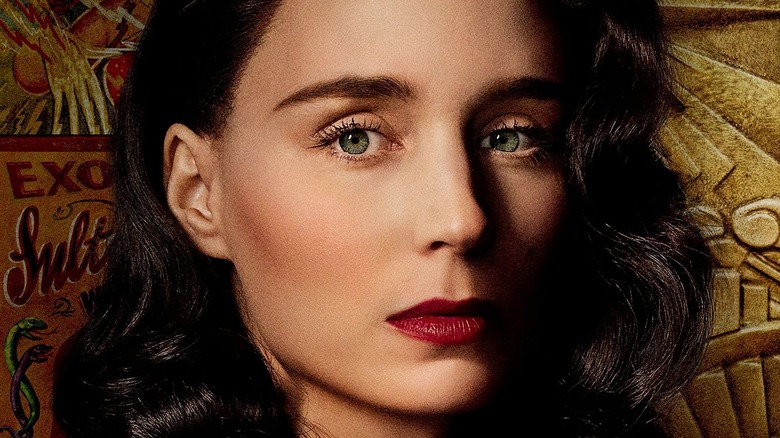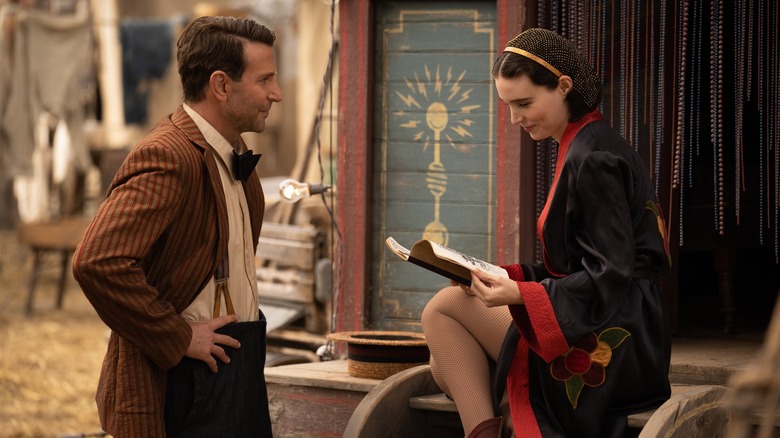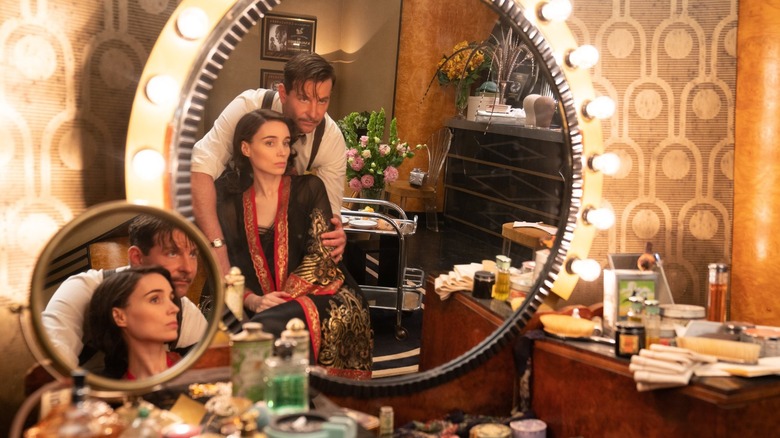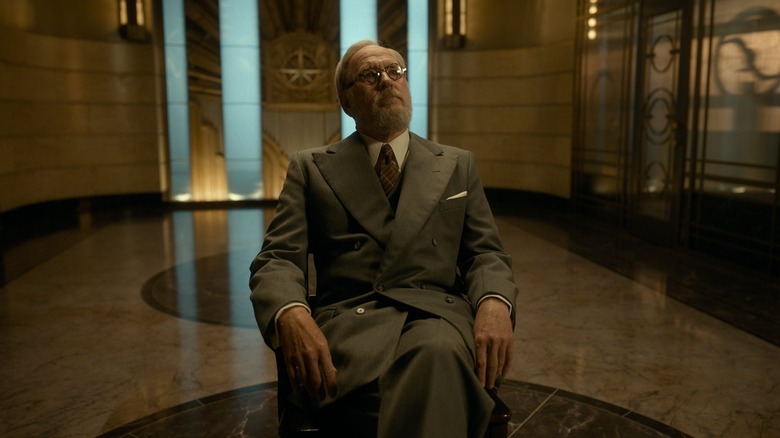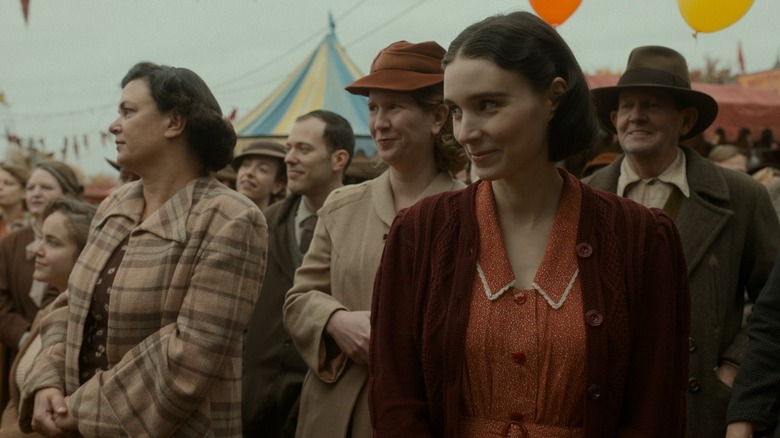Rooney Mara And Richard Jenkins Take You Inside Guillermo Del Toro's Nightmare Alley - Exclusive Interview
"Nightmare Alley," the new film from master genre director Guillermo del Toro, is a modern adaptation of a 1946 neo-noir novel from William Lindsay Gresham that was also made into a 1947 film starring Tyrone Power. The new movie stars Bradley Cooper as Stanton Carlisle, a drifter who ingratiates his way into a traveling carnival sideshow circa 1939, learns an old mentalist act once performed by a dissolute carny and his wife (David Strathairn and Toni Collette), then takes it to Buffalo, New York, where he intends to hoodwink wealthy elites by seeming to communicate with the dead.
Coming with him is Molly (Rooney Mara), an innocent sideshow performer who falls for Stanton and agrees to be his assistant despite her trepidation about doing what the carnies call "the spookshow." Once in Buffalo, Stanton is introduced via a corrupt psychiatrist (Cate Blanchett) to some of the city's wealthiest men, including Ezra Grindle (Richard Jenkins), a powerful industrialist desperate to ease his guilt over a past tragedy — making him dangerous yet vulnerable prey for Stanton's grift.
"Nightmare Alley" marks Jenkins' second collaboration with del Toro, after his performance in the director's 2017 film "The Shape of Water" earned him an Oscar nomination for Best Supporting Actor. Jenkins' other credits include "Six Feet Under," "The Visitor," "Step Brothers," "Burn After Reading," and the recently released "The Humans."
Mara's career took off in 2010 with a featured role in "The Social Network," followed in 2011 by her acclaimed turn as Lisbeth Salander in the American version of "The Girl with the Dragon Tattoo." Her other credits since then include "Her," "Carol," "Side Effects," and "A Ghost Story." In "Nightmare Alley," Mara finds herself working with del Toro for the first time, and in our exclusive interview with her and Jenkins, she tells Looper that the experience was "a genuine pleasure."
Going back to the original source material
Did either of you go back and familiarize yourself with the first movie or even go back and read the book?
Rooney Mara: I did not familiarize myself with either.
Richard Jenkins: I did both. I had seen the movie actually, but I went and I read the book. It was a good read.
Do you find doing that kind of thing useful, especially when you're working on something that's already been previously adapted?
Richard Jenkins: It wasn't that useful to me. I mean, you always hope it will be, but the truth is I don't really remember the book now. I think once I got ahold of the script, all that other stuff fades in the background. There wasn't anything about Grindle that jumped out at me from the book that I used. No, it's the text, the script for me is what matters.
Rooney, for you is that a choice to stick to the script and not be influenced in any way by a previous interpretation or by the original text?
Rooney Mara: To be honest, I can't fully remember why I didn't choose to read the book, because I usually do love to do that. I usually like to read source material. I didn't want to watch the film. I would like to go back and watch the film now. But yeah, I didn't want to watch the film before because it just felt like, what was the point? I knew Guillermo was doing his own thing, and had created a world of his own. So I just wanted to focus on that. But, I can't remember why I didn't read the book, because that is unusual for me.
Rooney Mara and Richard Jenkins dish on their characters
What spoke to you about the character of Molly? She's really the purest character in the story.
Mara: Yeah, I really loved the opportunity to play someone like that. It's very rare, to be able to play someone who is so sort of pure hearted. To me, the draw was Guillermo and just listening to him, he could really very much like stand and sell you anything. He could talk you into anything. He could have talked me into playing probably any of the parts and I would have been excited.
Jenkins: Well, I was up for Molly. He didn't give it to me.
You would have been a great Molly, Richard.
Jenkins: No, I don't think so. I don't know why, I don't think so.
Richard, you play a certain kind of character who comes fairly late into the game, but provides a pivotal turn in the narrative. Do you like that kind of role?
Jenkins: Well, I don't really think of it that way, but I look at a character and think, "First of all, I think, could I bring anything to this?" Because sometimes you read it and you go, "No, I don't. There's so many other people that could offer more than I can to this." But sometimes you read something and you go, "I'd like to see where this goes," and that's kind of how I look at things. I want to feel like I'm really part of the film. That's the feeling I want. Not the size of the part, but just that I'm really part of the movie and have a stake in the movie.
Rooney, since this is your first time working with Guillermo, how does he work with the actors as both individuals, and as an ensemble?
Mara: Working with Guillermo is such a genuine pleasure. He is so passionate about what he does and he's so knowledgeable about cinema, and also the story that he's trying to tell. He's just so excited to be there and he loves his characters so much. He loves all of his monsters and his props, and he's so involved in every single minute detail of the filmmaking. But at the same time, he's totally open and collaborative and excited to discover something that he hadn't thought of or wasn't expecting. It was a very, very unique, special experience working with him.
Guillermo del Toro gives his actors a special gift on every movie
In the past, Guillermo has given his actors extensive biographies of their characters. Did he do that with you on this film?
Mara: Yes, he did. I really loved it. I think it was useful. I actually then poached that idea for the next film I did, I made one for myself just because I loved it so much. But as an actor you gather all this stuff and information, and then at least you hope that on the day you throw that all away. Maybe it's somewhere inside of you, but you're just there, in the present moment. That's how I find it anyway.
Jenkins: Well, I have to tell this story. For my character in "The Shape of Water," he wrote a beautiful biography. I mean, it was really beautiful. And he said, "Did you read it?" I said, "Yes." He said, "Are you going to use it?" I said, "No, I don't think so." And he said, "Why?" I said, "Well, it's lovely, but I can't figure out how I feel about my mother. How does it manifest itself in this movie? Because it's not in the movie." I added, "It just confuses me, because my brain has to be a little clearer than that. I can't... all that information." So when I lost the first awards show, at the Golden Globes I think, or something, he was sitting right next to me. When I lost, he said, "If you'd used the back story, you might have won." And then, every award I lost after that, he would mime tearing up the back story.
Recreating the past and what the movie says for audiences today
The movie's production design is so seamless. How much of those sets were physically there for you and not added later?
Mara: It was all there. I mean, I would say it was 95% there. The sets were incredible, just incredible. I mean, I can't say enough about how amazing they were.
Jenkins: A lot of that was a sound stage, the interiors of Grindle's place, but that garden, which I spent a lot of time in, that garden in the winter at night, that's a beautiful ... I can't remember if it was in Toronto or was it in a city?
Mara: It was outside of Toronto. I can't remember what the city was called.
Jenkins: It was cold and we basically spent our time in the warming tent, Rooney and I, and it was still cold. Oh my god, it was cold.
What do you think is relevant to modern audiences about this film and this story now, 75 years after it was originally written?
Jenkins: Well, I don't think we've changed much. We all want to be reinforced. We all want reinforcement of what we believe and there's always somebody there to make a buck or advance themselves by doing that.
"Nightmare Alley" is now playing in theaters.
